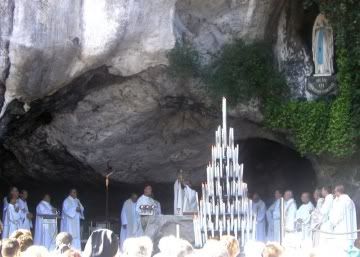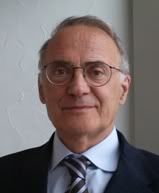
Lourdes

François-Bernard Michel,
Lourdes Medical committee and National Academy Medicine
France
The atheist propaganda machine is cranking away. I try to look for "studies that prove prayer works" I get a bunch of blogs about how prayer is stupid and doesn't work. There's a good article in Christianity Today talking about the limitations of double blind prayer studies. Then at least one blog registering disgust with the article. the basic argument in the article is we can't control for God's actions so we can't study it. They even quote C.S. Lewis saying this.
C.S. Lewis anticipated a carefully designed prayer study, but did not think it would show any positive, measurable "results." "The trouble is that I do not see how any real prayer could go on under such conditions," Lewis said. "Simply to say prayers is not to pray; otherwise a team of properly trained parrots would serve as well as men for our experiment." He argued that this approach to prayer treats it "as if it were magic, or a machine—something that functions automatically"—an accusation unintentionally but prophetically aimed at STEP and the other well-meaning attempts to measure the effects of prayer. If Lewis is right, such attempts always end up trying to measure something more akin to magic than a real movement of God.
The atheist attitude: hey don't confuse me with the facts of all that methodology stuff. Prayer didn't work all we need to know, can the details.
Here's a humanist piece that actually admits you can't control for outside prayer (the CT article says 91% of the anti-prayer study they considered said they had outside prayer.
Hector Avaelos (my old nemesis
form Loftus's blog)
Council for Secular Humanism
The problem with this and any so-called controlled experiment regarding prayer is that there can be no such thing as a controlled experiment concerning prayer. You can never divide people into groups that received prayer and those that did not. The main reason is that there is no way to know that someone did not receive prayer. How would anyone know that some distant relative was not praying for a member of the group that Byrd had identified as having received no prayer? How does one control for prayers said on behalf of all the sick people in the world? How does one assess the degree of faith in patients that are too sick to be interviewed or in the persons performing the prayers? Even Byrd acknowledges these problems and admits that "'pure' groups were not attained in this study." Since control groups are not possible, such purported scientific experiments are not possible.*Of course this is ignored by atheists on message boards so they can argue that the study actually disproves prayer.
The Dawkies express hatred for religious thinkers and source connected to theological institution. can't believe the Lourdes stuff because they must be liars since they have religious people on the committee.
For example I quote on my miracle page on Doxa this quotation by a respected secular reporter who writes about the good rules the Lourdes miracle committee uses:
MODERN MIRACLES HAVE STRICT RULES
BY DAVID VAN BIEMA
The paradox of human miracle assessment is that the only way to discern whether a phenomenon is supernatural is by having trained rationalists testify that it outstrips their training. Since most wonders admitted by the modern church are medical cures, it consults with doctors. Di Ruberto has access to a pool of 60 - "We've got all the medical branches covered," says his colleague, Dr. Ennio Ensoli - and assigns each purported miracle to two specialists on the vanquished ailment.
They apply criteria established in the 1700s by Pope Benedict XIV: among them, that the disease was serious; that there was objective proof of its existence; that other treatments failed; and that the cure was rapid and lasting. Any one can be a stumbling block. Pain, explains Ensoli, means little: "Someone might say he feels bad, but how do you measure that?" Leukemia remissions are not considered until they have lasted a decade. A cure attributable to human effort, however prayed for, is insufficient. "Sometimes we have cases that you could call exceptional, but that's not enough." says Ensoli. "Exceptional doesn't mean inexplicable."
"Inexplicable," or inspiegabile, is the happy label that Di Ruberto, the doctors and several other clerics in the Vatican's "medical conference" give to a case if it survives their scrutiny. It then passes to a panel of theologians, who must determine whether the inexplicable resulted from prayer. If so, the miracle is usually approved by a caucus of Cardinals and the Pope.
Some find the process all too rigorous. Says Father Paolino Rossi, whose job, in effect, is lobbying for would-be saints from his own Capuchin order: "It's pretty disappointing when you work for years and years and then see the miracle get rejected." But others suggest it could be stricter still.
There is another major miracle-validating body in the Catholic world: the International Medical Committee for the shrine at Lourdes. Since miracles at Lourdes are all ascribed to the intercession of the Virgin Mary, it is not caught up in the saint-making process, which some believe the Pope has running overtime. Roger Pilon, the head of Lourdes' committee, notes that he and his colleagues have not approved a miracle since 1989, while the Vatican recommended 12 in 1994 alone. "Are we too severe?" he wonders out loud. "Are they really using the same criteria?"
Atheist Troll "Backup" transforms the secular journalist Van Beema who is well respected into a "religious person" becasue he needs him to be one since he documents the good rules of the Lourdes Medical committee. Of cousre the implication being as a "religious nut" he's lying. They don't really have those rules because he's religious so he must lie.
This highlights how these Dawkies never listen to any source but their own. I have made a practice in my reserach of mostly using non Christian sources so they can't charge bias. Yet they have called Thomas Kuhn (one of the most highly respected secular thinkers) a "creationist." He was probalby an atheist or at least agnostic. He was most certainly a Darwinian.
On a few topics I use religious people because they did the work. This is met with the Bromide "he's a religious person he must be lying." If I said this about the atheist nut job Harris or Dawkins of course Dawkies would have a fit.
they actually can't see that Harris is the Craig of atheism and Dawkins is the Pat Robertson of atheism.
None of them can critically evaluate the nature of evidence. they just dogmatically assume any religious source has to be lying. They would resent that kid of analysis of their own most biased sources.
These guys are ghettoized. they just listen to their own guys and no one else.
On today's edition of Metacrock's Blog I post my essay "Analysis of Correlation and Causality in Miracle Hunting" which makes the point that claims of miracle are as much an epistemological problem as they are a scientific question, or even more so.
Hooks says:
"It's suspicious to say there's a professor on the medical committee. This must be a lie because no professor would ever support belief in healing," (of course they could still be on the committee--they actually use skeptics on the committee). Of the atheists are assuming the job of the committee is to "make up" or rubber stamp "miracles." If they they actual studied their work they would see this is foolish. There are 7000 "remarkably cases" that were rejected and only 67 miracles that made it to that status. If it's really a rubber stamp why don't they have 7067 miracles?
Here's a quote that proves they use professors:
http://www.ncregister.com/site/artic...ourdes_shrine/
"Professor François-Bernard Michel, co-chairman of the International Medical Committee of Lourdes and a member of the French Academy of Medicine, said in a March 2006 statement “there is no sick person coming to Lourdes who has never received treatment, and that is how it should be. This pushing forward of medicine has achieved such a degree of sophistication that it is more difficult than ever to appreciate in a cure what is applicable to treatment and what is attributable to an inexplicable medical phenomenon.”
Read more: http://www.ncregister.com/site/artic...#ixzz20t5cU7l7
O but it's from a catholic source it must be a lie. cant' reserach it or find out becuase it has to be a lie because it's in a Catholic site. all religious people lie. atheist never do.
here is a site of the french academy of medicine. we see Dr. Michel is on the board got his picture there.
http://www.academie-medecine.fr/orga....cfm?langue=fr
could the catholic site just lie and say he's on the Lourdes committee when he's not? do you think the don't have libel laws in France?
*I removed fn 8 from this quote because it was no longer available on the net.
2 comments:
Yea, I run into the whole "they're religious, ergo they are untrustworthy!" line a lot too. They fail to realize you can turn that logic on them and say that since researcher _x_ is an atheist, that therefore he can't be trusted. Whatever happened to looking at the quality of the work and evaluating the arguments and seeing whether any of them hold water? It's been simplified to an egregious strawman in the less intellectually motivated atheist communities, and even in the more cerebral ones as well.
It gives them more mileage to say that stuff than it does to risk being wrong by looking at the work.
Take my plight with the RE studies, why can't they just look one up in the library, over a five year period? They get more out of saying "we don't have a link so they must not exist." Or what they have taken to saying now "where are they?" like they can't be in journals on library shelves.
Post a Comment